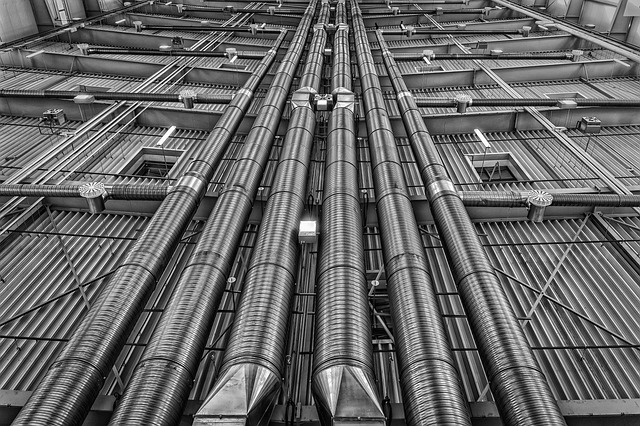Smart gas water heaters integrate IoT for enhanced control and energy efficiency. Users remotely adjust temperature, monitor consumption, and program schedules via home automation networks. Tankless systems eliminate standby heat loss, reducing energy usage. These features offer convenience, savings, and sustainability upgrades to residential hot water systems. Integration requires compatibility standards like Zigbee or Wi-Fi for centralized control and optimal performance. Professional installation ensures safety and enhances user experience. Smart gas heaters contribute to a greener home environment with optimized heating and reduced utility bills.
In today’s tech-driven world, the integration of smart gas water heaters with home automation systems is transforming everyday comforts. This article explores the evolving landscape of smart water heating solutions, delving into the benefits, installation, and energy efficiency gains of these advanced appliances. From understanding the fundamentals of smart gas water heaters to choosing compatible standards and enhancing energy performance, we guide you through the process, ensuring your home stays comfortable while reducing energy costs.
- Understanding Smart Gas Water Heaters
- Benefits of Home Automation Integration
- Choosing the Right Compatibility Standards
- Installation Process and Considerations
- Enhancing Energy Efficiency with Smart Controls
Understanding Smart Gas Water Heaters

Smart gas water heaters are advanced devices that integrate modern technology with traditional heating systems. These heaters leverage IoT (Internet of Things) connectivity to offer enhanced control, monitoring, and efficiency. By seamlessly connecting to home automation networks, users can remotely adjust temperature settings, receive real-time energy consumption data, and program schedules for optimal hot water supply.
This integration goes beyond convenience; it promotes energy efficiency in residential water heating. Tankless gas systems, for instance, eliminate the need for a storage tank, reducing standby heat loss and lowering overall energy usage. Whether powered by natural gas or propane, these smart heaters provide precise temperature control, minimizing energy waste. This technology is particularly beneficial for homeowners looking to upgrade their hot water systems while contributing to more sustainable residential gas fired heaters practices through improved energy efficiency.
Benefits of Home Automation Integration

Integrating a smart gas water heater with your home automation system offers numerous advantages for modern households. One of the key benefits is enhanced convenience and control over your hot water systems. With automated controls, you can programme your water heater to activate at specific times or adjust temperatures remotely using your smartphone or voice assistants, ensuring optimal energy usage. This integration allows for a more comfortable living environment as you can instantly have access to hot water without waiting for traditional heaters to warm up.
Moreover, smart gas water heating solutions contribute to significant energy savings and cost reductions. These systems can optimize heating processes by precisely controlling the temperature and flow rate, minimizing energy wastage. Tankless gas systems, for instance, only heat water on demand, eliminating the need for constant maintenance of a stored supply. This efficiency not only reduces utility bills but also makes them environmentally friendly, especially when paired with natural gas or propane water heaters, offering a greener alternative to traditional tank water heaters and gas fired heaters in residential settings.
Choosing the Right Compatibility Standards

When integrating a smart gas water heater into your home automation system, selecting devices that adhere to universal compatibility standards is paramount. This ensures seamless communication between your heater and other smart home devices, allowing for centralized control and automated routines. Popular protocols like Zigbee, Z-Wave, or Wi-Fi are widely supported in modern smart home ecosystems, enabling easy connections across various brands and models of gas water heaters.
Choosing the right standard means considering factors such as range, power consumption, and data transfer speeds. For instance, while Wi-Fi offers excellent range and speed, it may not be suitable for older or less energy-efficient devices due to its higher power demands. Conversely, Zigbee and Z-Wave are more power-efficient but have shorter ranges. Selecting the appropriate standard based on your home’s layout, existing infrastructure, and specific gas water heater models ensures optimal performance and a truly integrated smart home experience, enhancing both convenience and energy efficiency in your residential hot water systems, including tank and tankless gas systems, as well as natural gas or propane water heaters.
Installation Process and Considerations

The installation process for a smart gas water heater integrating with home automation involves careful consideration and planning. Initially, assess your residential water heating needs and available space to ensure compatibility with various tank and tankless gas systems. Professional installers are crucial in this step to verify proper ventilation, electrical connections, and gas line requirements. Once determined, the actual installation requires precise alignment of the heater with your home automation system. This includes setting up communication protocols, ensuring secure data transmission, and configuring user interfaces for remote access and control.
Considerations extend beyond technical aspects. Energy efficiency is a primary factor, as smart heaters offer advanced temperature regulation, reducing energy consumption and lowering utility bills. Safety is paramount, especially with gas-fired heaters; proper ventilation and leak detection mechanisms must be in place. Additionally, compatibility with other home devices and systems ensures seamless automation and optimal hot water performance. Regular maintenance routines should also be established to keep your smart gas water heater running smoothly for years, contributing to a comfortable and eco-friendly residential environment.
Enhancing Energy Efficiency with Smart Controls

Smart gas water heaters are transforming residential water heating with advanced controls that enhance energy efficiency and convenience. These innovative devices go beyond traditional tank or tankless gas systems by integrating seamlessly into home automation networks, allowing users to monitor and manage hot water usage from their smartphones or voice assistants. With real-time data on temperature settings, cycling times, and even leak detection, homeowners can optimize their gas water heating to match exacting demands.
This level of control not only saves energy but also reduces utility bills. By scheduling off-peak hours for water heating or remotely adjusting temperatures while away from home, users can take advantage of lower energy rates and minimize unnecessary consumption. The result is a more sustainable and cost-effective hot water system that contributes to a greener home environment, making smart gas water heaters a game-changer in modern home water heating solutions.
The integration of smart gas water heaters into home automation systems offers a compelling blend of convenience, energy efficiency, and cost savings. By seamlessly connecting to existing automated environments, these advanced heaters provide homeowners with precise control and real-time monitoring capabilities. With the right compatibility standards and careful installation, they can significantly enhance overall energy efficiency while reducing utility bills. This innovative approach to water heating represents a promising step forward in the evolution of smart homes, promising greater comfort and sustainability.
